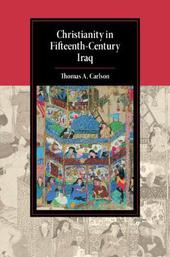
|
Christianity in Fifteenth-Century Iraq
Paperback / softback
Main Details
| Title |
Christianity in Fifteenth-Century Iraq
|
| Authors and Contributors |
By (author) Thomas A. Carlson
|
| Series | Cambridge Studies in Islamic Civilization |
|---|
| Physical Properties |
| Format:Paperback / softback | | Pages:323 | | Dimensions(mm): Height 230,Width 153 |
|
| Category/Genre | History of religion
Christianity
Islam |
|---|
| ISBN/Barcode |
9781316637135
|
| Classifications | Dewey:275.6705 |
|---|
| Audience | | Professional & Vocational | |
|---|
| Illustrations |
Worked examples or Exercises; 5 Maps; 2 Halftones, black and white
|
|
Publishing Details |
| Publisher |
Cambridge University Press
|
| Imprint |
Cambridge University Press
|
| Publication Date |
18 June 2020 |
| Publication Country |
United Kingdom
|
Description
Christians in fifteenth-century Iraq and al-Jazira were socially and culturally home in the Middle East, practicing their distinctive religion despite political instability. This insightful book challenges the normative Eurocentrism of scholarship on Christianity and the Islamic exceptionalism of much Middle Eastern history to reveal the often unexpected ways in which inter-religious interactions were peaceful or violent in this region. The multifaceted communal self-concept of the 'Church of the East' (so-called 'Nestorians') reveals cultural integration, with certain distinctive features. The process of patriarchal succession clearly borrowed ideas from surrounding Christian and Muslim groups, while public rituals and communal history reveal specifically Christian responses to concerns shared with Muslim neighbors. Drawing on sources from various languages, including Arabic, Armenian, Persian, and Syriac, this book opens new possibilities for understanding the rich, diverse, and fascinating society and culture that existed in Iraq during this time.
Author Biography
Thomas A. Carlson is Assistant Professor of Middle Eastern History at Oklahoma State University. His research explores the religious, ethnic, and linguistic diversity of medieval society from Cairo to Samarqand to Constantinople, as well as the multifaceted and contingent process of Islamization. His articles have appeared in the International Journal of Middle East Studies, the Journal of the American Oriental Society, Hugoye: Journal of Syriac Studies, and elsewhere.
Reviews'This book is a masterpiece and a model. It is a masterpiece of discovery. Through meticulous use of seldom-considered texts in every language of the region, it brings alive a long-neglected section of the population of Iraq in the late middle ages - the Christians: the structure of their churches; their relations with their Muslim neighbors and rulers; their quite distinctive sense of religious community. The book is a model for future work. It offers a way to do justice to the unsuspected diversity of the Middle East. All too often presented to us as a monolithic, Islamic region, the creativity of medieval Iraq and elsewhere arises, in fact, from the continued juxtaposition of new and ancient faiths in what had remained, since ancient times, an ever-fertile and variegated 'cradle of civilization'.' Peter Brown, Professor Emeritus of History at Princeton University, New Jersey 'Professor Carlson's study deals with a major Christian community, the Church of the East, during a deeply troubled and sometimes chaotic period in its core territory of northern Iraq. His important contribution is to show how a politically powerless Church was able to forge a strong and resilient communal identity among its members by drawing on its resources of doctrine, liturgy, and an ecclesiastical organization that reached deep into society.' R. Stephen Humphreys, Professor emeritus, University of California, Santa Barbara 'In this wonderful study, Carlson illuminates the hitherto overlooked history of East Christian communities in Iraq before the rise of the Ottoman Empire. Basing his analyzes of community dynamics on a wide array of sources, Carlson's work will provide scholars with much-needed new information and a fresh perspective on a critical moment of transition in Middle Eastern history.' Sergio La Porta, California State University 'Thomas A. Carlson has used his formidable linguistic skills to marshal a truly impressive and disparate set of sources and recreate a world about which little was known. But this is much more than an expert piece of detective work and fascinating historical reconstruction: it contains a profound message for how we think about both Christianity and the Middle East.' Jack B. Tannous, Princeton University, New Jersey
|